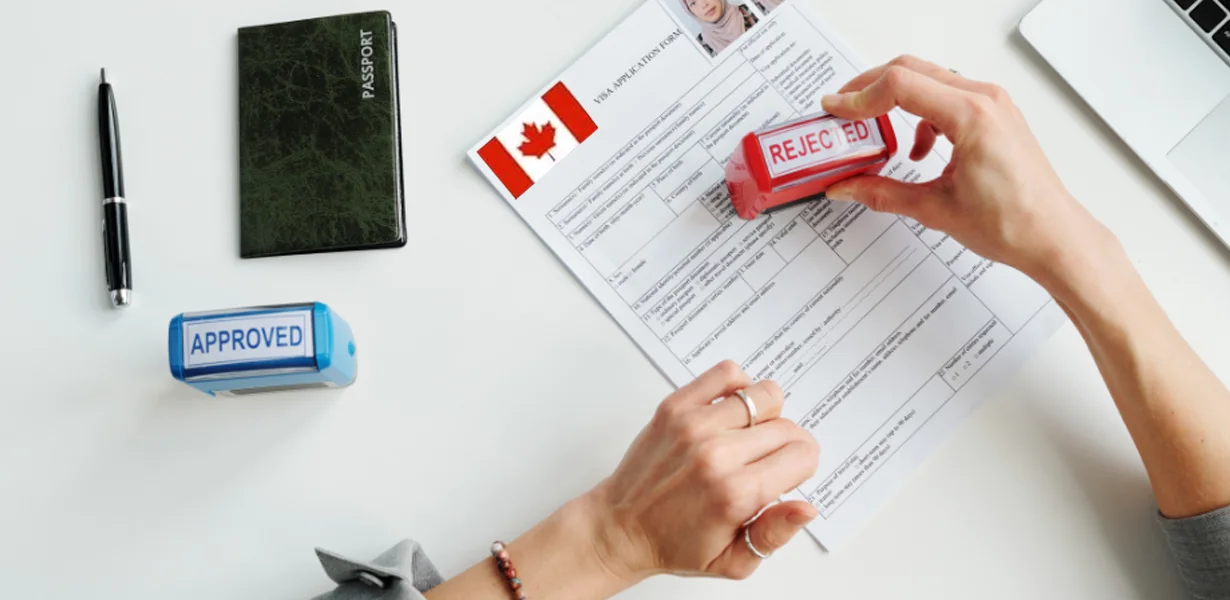How to Overcome a Canadian Visa Refusal
Receiving a refusal for a Canadian Visitor, Study, or Work Visa can be discouraging, especially if you’re unsure about the exact reasons for the rejection. The Immigration, Refugees and Citizenship Canada (IRCC) provides a letter explaining the refusal, but it might not always offer clear details. If your Canadian visa application has been rejected and it has disrupted your travel, work, or study plans, don’t worry—there are steps you can take to reapply and improve your chances of success.
To receive professional immigration consultation, please fill out the form below:
Difference between Refusal and Return
A refusal typically occurs when you fail to meet essential requirements such as proving sufficient finances, intent to leave Canada, or meeting health, security, or criminal admissibility standards. A return, on the other hand, happens due to missing documents or errors in your application. If your application is returned, you can simply correct the mistakes and reapply.

Common Reasons for Visa Refusal
There are various reasons why your visa application might be rejected. These include:
- Proof of Funds: Not demonstrating enough funds to support your stay in Canada.
- Funds Source: Not clarifying how you accumulated your funds.
- Travel History: Limited or no travel history outside your home country.
- Lack of Employment Prospects: If your country has a significantly lower salary than Canada, the visa officer may doubt your intention to return.
- Missing or Incorrect Documents: Failure to provide necessary documents or providing false ones.
- Current Employment Situation: Lack of stable employment may negatively impact your chances.
- Family Ties: The absence of immediate family members in your home country may raise concerns.
- Length of Stay: Applicants who plan to stay longer may require more significant financial backing.
- Unclear Purpose of Visit: Not providing a sufficient explanation of your reason for visiting Canada.
- Misrepresentation: Providing false or misleading information in your application.
How to Reapply After a Refusal
If your application was rejected, don’t be discouraged. Here’s what you can do:
- Obtain Notes from the Officer: Review the officer’s comments to understand the reasons for refusal and identify areas that need improvement.
- Consult an Immigration Expert: A skilled immigration consultant can help you understand the reasons for refusal and guide you through the reapplication process.
- Prepare a Stronger Application: Ensure that you address the previous refusal reasons, correct any mistakes, and submit additional supporting documents as needed.
When is Reapplying a Good Idea?
Reapplying for a visa is typically a good option when:
- The refusal was due to missing information or small mistakes that can be easily rectified.
- Your situation has changed (e.g., financial standing or family situation) since your last application.
- You believe that the visa officer made an error in assessing your case.
However, if the refusal was due to more serious issues, such as a criminal background or overstaying a previous visa, reapplying might not resolve the issue.
Reapplying for Canadian Visa After a Refusal: Steps to Follow
Step 1: Understand the Reason for Refusal
Obtain a copy of the officer’s notes and thoroughly understand why your application was rejected.
Step 2: Consult with an Immigration Consultant
Book a consultation to strategize on how to strengthen your case for the new application.
Step 3: Submit a Complete and Accurate Application
Make sure all required documents are provided, including the updated forms and any additional information requested.
Appeal vs. Reapply
If your visa is refused, you can also appeal the decision, depending on the type of visa and the refusal reasons. The appeal process involves submitting a notice to the Immigration Appeal Division (IAD) within 30 days and attending a hearing. However, not all refusals can be appealed, and in many cases, the best course of action is to reapply with stronger documentation.
Impact of Refusal on Future Applications
A visa refusal is recorded in your immigration history, which can affect your future visa applications, not only for Canada but also for other countries. However, if the reason for refusal has been resolved or corrected in your new application, there is still a chance for approval.
Conclusion
Facing a Canadian visa refusal can be frustrating, but it’s important to remember that it’s possible to reapply and improve your chances of success. By identifying the reasons for the refusal, addressing them properly, and seeking professional guidance, you can increase your chances of obtaining your visa in the future.
For assistance with your Canadian visa application or to reapply after a refusal, consider consulting an experienced immigration consultant who can provide tailored advice and support.

